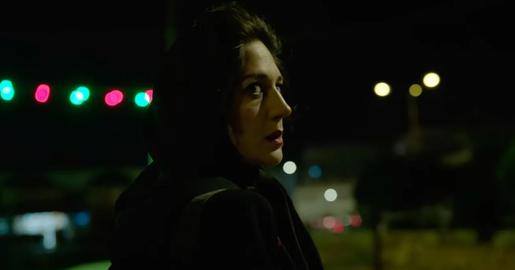The Iranian actress and photographer Zar Amir Ebrahimi was on the red carpet in Cannes on Sunday to mark the premiere of Holy Spider, Ali Abbasi's dramatic re-telling of the story of Iran's most infamous serial killer (more on this here). The film, in which Amir Ebrahimi, 41, plays a journalist on the tail of the murderer, received a six-minute standing ovation as the credits rolled.
The film's success at Cannes - and news of its lead actress having cast in another film role on the same day - came alongside a victory of another kind. A photo of Amir Ebrahimi looking triumphant in front of the cameras made waves on Persian-language social media. Many remember what she fought through to get to this moment. And our Persian editor Shima Shahrabi is one of them. This is her tribute to an actress who made her own luck.
She herself posted the same picture on her Instagram page, the one that for the past two days has spread like wildfire on social media. In the picture, she has her arms raised up like two wings, inclining her head, her smiling eyes glancing down at the red carpet under her feet. The comparison made by many since Sunday is, of course, with a phoenix rising from her ashes.
The life of Zar (Zahra) Amir Ebrahimi could have inspired a movie all by itself. In part, it is that of a actress who was at the height of her fame in 2006, when a video of her making love to a young man was leaked on the internet, then released on DVD.
She was arrested, interrogated and charged with making an obscene film by the Iranian judiciary, after which she left her country of birth. For years she kept silent about this episode in her life – up until 2019 when, in a TV interview, she said that an actor friend and co-star in the hugely popular TV series Nargess had taped and leaked the video. The actor Majid Bahrami confessed to the crime and was sentenced to six months in prison.
***
Sixteen years have passed since the scandal broke. Now here she is, standing on the red carpet at Cannes.
She could have kissed the cameras goodbye the year that DVD of her private moment was being sold on the streets (dubbed Nargess 2), the year it was passing from one mobile phone to the next, the year her name was on everybody’s lips. She could have mourned her life from then on as she did in those first few months, when she stayed home most of the time and, if she ventured out, did so hiding behind dark glasses and a scarf pulled over her forehead. She could have stayed depressed, cursed her misfortune and buried all her dreams.
It has been said that three elements make the lives of successful people: ingenuity, striving and luck. But for Zar Amir Ebrahimi, who was just getting started, the third element vanished before time. Many believed that with that tape, Amir Ebrahimi had reached the end of the road.
But this wasn’t how she saw it. She took luck out of the equation and, instead, strove harder and harder. She kept running in silence, injured but resolute. Once in a while, bits and pieces of news about her would be published, but even in these short items, she was judged unfavorably. Our runner could hear the voices around her, voices that shouted: “Hey you, your leg is broken, how can you run!?”
But she looked only ahead.
Dear Ms. Amir Ebrahimi! Stories of you remind me of John Stephen Akhwari, the Tanzanian marathon runner. In the 1968 Olympics in Mexico City, he wasn’t yet halfway to finish line when he fell, wounding and dislocating his knee. But he kept going. Many warned him he wouldn’t finish, but he kept going. He reached the finish line an hour and four minutes after everybody else, after the sun had set and with only a few thousand people left in the stadium. Why did he continue with an injured knee, he was asked? “Because I wanted to prove to myself that I’d done my best.”
From that moment on, he became known as the world’s most beautiful loser. His name is better remembered than that of the marathon winner.
You tried your best, as he did. But you also won. As you raised up your hands on that red carpet, you knew that you had won. Others saw that you had won as well. Nobody could see this picture and fail to notice that you had won. You changed the finish line and won.
Perhaps, some day in a democratic society, your story will find its way into the textbooks of schoolchildren: the story of a woman who was ruthlessly judged because of a video that showed the most intimate moments of her life, who was ostracized by her colleagues and everybody else besides, who was arrested, interrogated and eventually left her country.
And all these years you said nothing, and just continued running. Would that your story in that textbook be decorated with the same picture, the picture of Zar Amir Ebrahimi, taking to the sky from her ashes, like a phoenix!
visit the accountability section
In this section of Iran Wire, you can contact the officials and launch your campaign for various problems






















comments